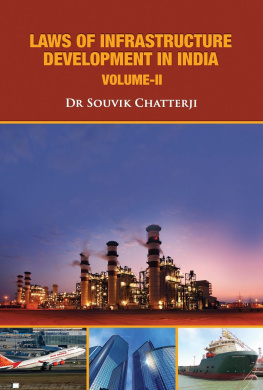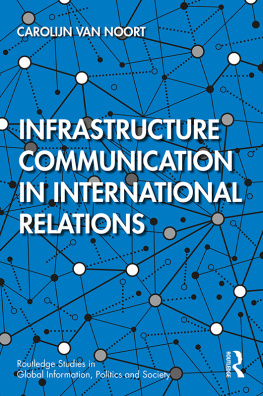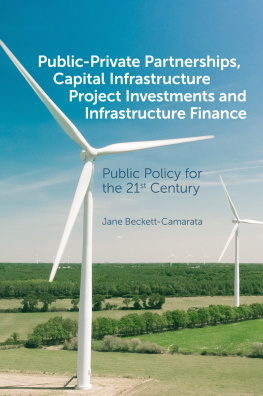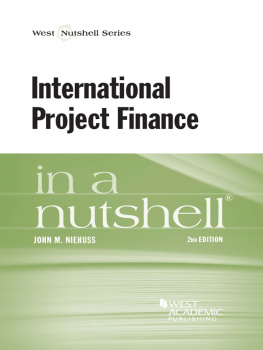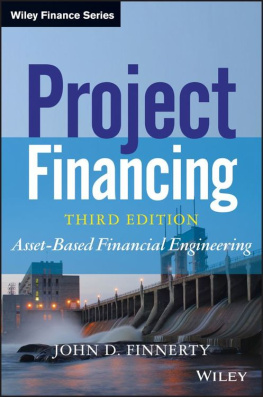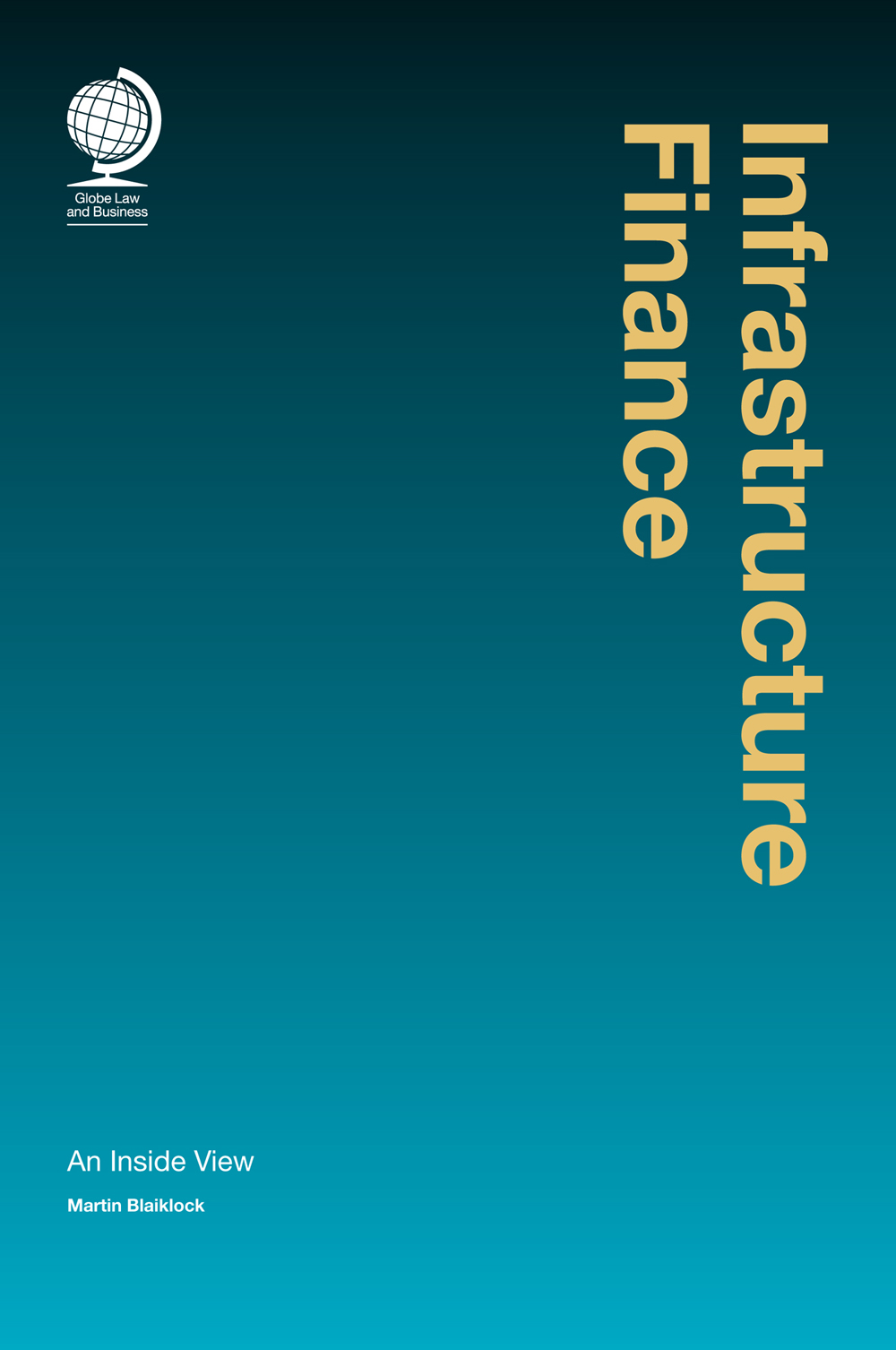

Author
Martin Blaiklock
Managing director
Sian ONeill
Infrastructure Finance: An Inside View
is published by
Globe Law and Business Ltd
3 Mylor Close
Horsell
Woking
Surrey GU21 4DD
Tel: +44 20 3745 4770
www.globelawandbusiness.com
Printed and bound by Gomer Press
Infrastructure Finance: An Inside View
ISBN 9781787420830
EPUB ISBN 9781787420847
Adobe PDF ISBN 9781787420854
Mobi ISBN 9781787420861
2017 Globe Law and Business Ltd
The right of Martin Blaiklock to be identified as Author of this Work has been asserted by him in accordance with sections 77 and 78 of the Copyright, Designs and Patents Act 1988.
All rights reserved. No part of this publication may be reproduced in any material form (including photocopying, storing in any medium by electronic means or transmitting) without the written permission of the copyright owner, except in accordance with the provisions of the Copyright, Designs and Patents Act 1988 or under terms of a licence issued by the Copyright Licensing Agency Ltd, 6-10 Kirby Street, London EC1N 8TS, United Kingdom (www.cla.co.uk, email: licence@cla.co.uk). Applications for the copyright owners written permission to reproduce any part of this publication should be addressed to the publisher.
DISCLAIMER
This publication is intended as a general guide only. The information and opinions which it contains are not intended to be a comprehensive study, nor to provide legal advice, and should not be treated as a substitute for legal advice concerning particular situations. Legal advice should always be sought before taking any action based on the information provided. The publishers bear no responsibility for any errors or omissions contained herein.

Table of contents
Acknowledgements
I would like to thank all those colleagues who, directly or indirectly, have made their contributions knowingly or not! to a corner of the financial markets that ever continues to fascinate.
In particular, I would like to thank Globe Law and Business and their team for providing the opportunity to shed some light onto an area of finance that is vital to the sustainability of the global economy.
I would also like to thank those friends and family who, through their forbearance and patience, have provided the support needed for me to arrive at this point, when I have put pen to paper. It may not have been such fun for them, but I hope they appreciate the output!
About the author
Martin Blaiklock has over 40 years experience of structuring, developing, evaluating and implementing the funding of public and private sector projects that is, private finance initiatives (PFIs), public-private partnerships (PPPs) and so on in infrastructure, energy and the process industries throughout the world and, particularly, in emerging markets.
Uniquely, Mr Blaiklock has worked for extended periods in an investment bank (Kleinwort Benson Ltd), a commercial bank (HSBC) and a development bank (the European Bank of Reconstruction and Development the EBRD as director of power and energy utilities).
Since 1995, he has operated as an independent consultant and was an expert witness for the Parliamentary Inquiry into the London Underground PPP.
Over the past six years he has undertaken over 120 training seminars on project finance/PPPs for the World Bank/International Finance Corporation, the EBRD, the African Development Bank, governments, contractors, utilities and commercial banks in over 40 countries.
He is also a member of Independent Port Consultants (www.port-consultants.com), a London-based association of independent port development specialists.
Preface
In my nearly 40 years working as a banker in infrastructure and energy project finance, I have been fortunate to have worked alongside many experts in the field, negotiated with many across the table and travelled the world to see the products of my travails. It has undoubtedly been a rich experience and, generally, great fun!
There came a time, however not least when a colleague at a City Christmas party suggested that I might be the longest serving member of the project finance community in London when it felt appropriate and useful to record these events and experiences.
The fundamentals of project financing have remained largely unchanged over the years. While lawyers, consultants, accountants, financial advisers and investment bankers (as opposed to merchant bankers whose word was their bond sadly now a dying, even extinct, breed) are forever attempting to create ever more complex project structures, it is actually simple funding structures which form the basis for successful project finance.
However, at times the excitement of creating a new project can overtake common sense, resulting in over-complexity. Thus, the concession agreement for the London Underground public-private partnership (PPP) was reportedly over 3,000 pages long (maybe reflecting the fact that no one had ever undertaken a PPP before for a major city and suburban metro system anywhere in the world). More recently, a surge of UK high-value project proposals, such as Londons Super Sewer (4 billion), the HS2 fast-rail link (estimated at 50 billion), Hinkley Point Nuclear Power Plant (18 billion), Heathrow Northwest Runway Expansion (18 billion) and Barrages in the Severn Estuary (estimated at 25 billion), has demonstrated that vanity also pervades Whitehall.
Such projects also provide great business opportunities for lawyers and advisers, with fees paid for creating the monster in the first place, with yet more fees incurred when project managers need help when matters go wrong. But that aside, are these infrastructure projects, taken as a whole, sensible ventures? Will they deliver the value for money expected?
As a scientist by first degree, I perceive project financing and the use of private capital for investment in public service assets such as PPPs as similar to process engineering. It is like building a brick wall. One needs a lot of bricks which, if suitably assembled, will withstand the weather over a long period. The technology is simple, but the multiplicity of the component parts makes it a complex task. Nevertheless, the secret of a walls strength and its longevity lies in the quality of the mortar holding the bricks together and the skills of the architect and builder.
Arising out of the mass of detail that these infrastructure transactions demand is the fact that no one person can manage and have all the expertise for all aspects of a deal. Project finance, and PPP, is the ultimate team game in the financial sector. Typically, one needs a core team comprising a banker, a lawyer, a technical expert, an environmentalist and proposal manager, plus probably the support of a computer modeller, to bring a deal to a successful conclusion. Furthermore, the team needs to be politically aware, as the infrastructure assets form the basis for a public service for which, ultimately, the relevant government has to carry responsibility.
Another consideration for all involved is that putting these deals together is time consuming. It can take months, if not years, to move from project concept to financial close. As part of this process, colleagues can become friends. The camaraderie of the project teams that I have worked with, forged through hours of preparation and negotiation and thereafter project monitoring, is one lasting pleasure that I have had over my many years in this business. The sector may not make many millionaires, but it certainly sustains many long-lasting friendships.
Next page

